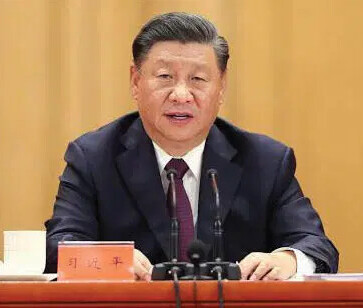China announced on Friday that it would raise tariffs on U.S. goods to 125% but would disregard any additional tariffs imposed by President Donald Trump, stating that it no longer makes economic sense for importers to purchase from the U.S. Following a turbulent week in which both nations actively escalated trade barriers, Beijing dismissed Trump’s tactics as a “joke” and a “numbers game.”
China blamed the U.S. for causing market instability through its extensive tariffs, asserting that the U.S. should “bear full responsibility” for the resulting chaos. Trump’s tariffs are part of his strategy to incentivize manufacturers to keep operations within the United States and to encourage other countries to reduce trade barriers against American goods.
After a week of market upheaval, President Trump halted many tariffs for 90 days but increased tariffs on China to an eye-popping 145%. In response, China announced a new round of retaliatory tariffs, bringing its levies to 125%, effective Saturday.
However, the Chinese finance ministry stated that any further U.S. actions would be disregarded, noting that the current tariff levels make it unviable for U.S. goods to be accepted in the Chinese market. Beijing criticized the U.S. for treating tariffs as a “numbers game” that lacks economic significance.
Additionally, China plans to file a lawsuit with the World Trade Organization regarding the latest U.S. tariff increases.
President Trump has acknowledged the “transition costs and problems” inherent in his tariff strategy but has downplayed the turmoil in global markets, asserting that in the end, it will lead to “a beautiful thing.” He praised the European Union for holding off on retaliatory tariffs after learning about U.S. actions toward China.
However, EU chief Ursula von der Leyen indicated that the bloc is prepared with various countermeasures if negotiations falter, including potential levies on digital services advertising revenues. French President Emmanuel Macron emphasized the need for Europe to be strong and to continue preparing counteractions, as the tariffs are currently only paused, not eliminated.
Meanwhile, during talks with Spain’s Prime Minister Pedro Sanchez, Chinese President Xi stated that China and the EU should collaborate to resist what he termed “unilateral bullying practices,” which he argued would protect their legitimate rights and promote international fairness.
Following declines on Wall Street, Asian markets faced renewed pressure on Friday. Tokyo experienced a drop of over four percent, just a day after jumping more than nine percent, while markets in Sydney, Seoul, and Singapore also fell. European markets also declined in response to China’s latest trade actions.
Concerns about a global economic slowdown led to decreases in oil prices and the dollar, while gold reached a new record above $3,200, as investors moved away from traditionally stable U.S. Treasuries amid uncertainty surrounding Trump’s unpredictable policies.
Stephen Innes of SPI Asset Management remarked, “The sugar high from Trump’s tariff pause is fading fast,” emphasizing that the ongoing trade war between the world’s two largest economies has no winners.
Critics of Trump’s policies argue that they are creating chaos for companies dependent on complex supply chains, straining relationships with key allies, and increasing costs for U.S. consumers. In contrast, Commerce Secretary Howard Lutnick expressed optimism on social media, claiming “the Golden Age is coming” and emphasizing a commitment to protect U.S. interests and stimulate economic growth.
Trump has warned that tariffs may be reinstated after a 90-day period if an acceptable deal isn’t reached. Canadian Prime Minister Mark Carney described Trump’s tariff reversal as a “welcome reprieve” and indicated that Ottawa will start negotiating a new economic agreement with the U.S. following elections on April 28.
Additionally, Vietnam has agreed to initiate trade talks with the U.S., and Pakistan plans to send a delegation to Washington. As China seeks allies against Trump’s trade measures, President Xi is set to visit Vietnam, Malaysia, and Cambodia next week, with trade issues likely to be a prominent topic.
